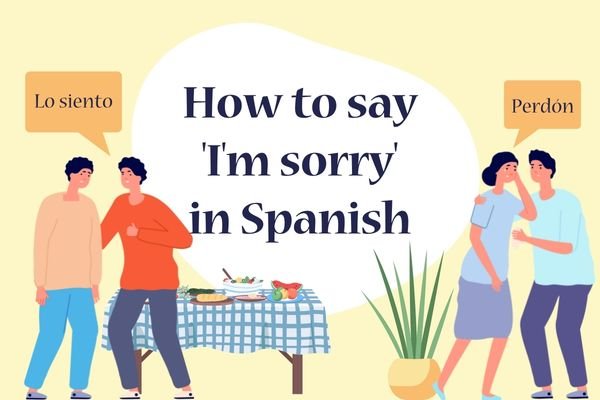How to Say ‘I’m Sorry’ in Spanish
While in English it’s common to use, or rather overuse, the word ‘sorry’ - we’ve all been there - in Spanish it’s not that simple. We’re often taught that ‘lo siento’ will do and, although it is a form of expressing empathy and remorse, it’s not always the best or even the right way to say ‘I’m sorry’.
When you think about it, there are dozens of different degrees of apology and as many reasons for making one. Sometimes it’s easy to throw out that ‘I’m sorry’ and other times it takes strength and courage. Are we empathizing? Apologizing for something out of our control? For some blunder we made? For bumping into someone? Have we just caused some hardship or let our best friend down? Unlike in the English language, hispanohablantes have different forms of saying ‘sorry’ depending on the context. The expressions are also at times interchangeable, but don’t fret! We’ll teach you the most common expressions so you can begin practicing and feel confident that your next ‘I’m sorry’ comes across as genuine.
Lo siento
Sentir is the verb meaning ‘to feel’. The expression ‘lo siento’ directly translates to ‘I feel it’. Most Spanish language learners are taught to use ‘lo siento’ to say ‘I’m sorry’. However, it is not correct for all apologies, although the listener will get the idea that you’re apologizing about something.
Lo siento - I’m sorry
Lo siento mucho - I’m so sorry
Lo siento tanto - I’m so sorry
Siento mucho que haya … - I’m so sorry that … (something happened)
Here are the most common and correct uses of ‘lo siento’ or ‘siento mucho’:
To express empathy or commiserate with someone about something.
Lo siento.
I’m sorry. (…that happened to you / or you feel that way.)
Lo siento mucho.
I’m so sorry. (…that happened to you / or you feel that way.)
Siento mucho que no te hayan aceptado en el trabajo. / Siento mucho que no conseguiste el trabajo.
I’m so sorry you didn’t get the job.
To apologize for something minor like bumping into someone.
¡Ay lo siento! No te vi.
Oh I’m sorry! I didn’t see you.
To express condolences when someone passes.
Lo siento mucho por la pérdida de tu abuelita.
I’m so sorry for the loss of your grandma.
To say ‘I’m sorry for…’, use lo siento followed by por and a noun or infinitive form of the verb.
Lo siento por ese hombre tan grosero.
I’m sorry about that rude man.
Lo siento por haber llegado tarde.
I’m sorry for being late.
Disculpe/a
The verb, disculpar, directly means ‘to excuse’ or ‘to forgive’. The expression disculpe is used to apologize for a mistake, yet is not used for serious apologies.
Disculpe - Sorry (formal)
Disculpa - Sorry (informal)
Discúlpame - Forgive me
Te pido disculpas - I ask for your forgiveness
Followed by por and a noun or infinitive form of the verb.
Mil disculpas por no asistir a la reunión hoy.
I’m so sorry for not attending the meeting today.
Disculpa por el carro tan sucio.
I’m sorry for the filthy car.
Perdón
The verb, perdonar, means ‘to forgive’. The expression, perdón, is most accepted when you need to apologize and ask for forgiveness in serious situations. Ironically, it can also be used in situations where you need to give a light apology.
Perdón - Sorry
Perdóname - Forgive me
Te pido perdón - I ask for your forgiveness
When apologizing for hurting or offending someone.
In these cases, the apology carries more significance and can be more difficult to express as you’re accepting the guilt.
Perdóname por haber olvidado nuestro aniversario.
Forgive me for forgetting our anniversary.
Perdón por no haber dicho la verdad.
I’m sorry for not telling you the truth.
Much like lo siento and disculpa, you can say perdón when you accidentally do something wrong, like step on someone’s foot or forget to switch off the lights when leaving a room.
¡Perdón! Se me olvidó. Voy a comprar la comida ahorita.
Sorry! I forgot. I’ll go buy the food now.
¡Ups! ¡Perdón! No lo ví.
Oops! Sorry! I didn’t see it.
Lo lamento
The verb, lamentar, directly translates to ‘lament’. The expression, lo lamento, is also used to apologize, yet in Mexico it’s not used as often and is considered more academic and formal.
Lo lamento - I lament it
Lo lamento mucho - I’m so sorry
Lamento mucho la pérdida de (tu tío)… - I’m so sorry about the loss of … (your uncle).
Lamentamos la situación en que se encuentra su equipo de internet.
I’m so sorry about the situation with your internet.
Other expressions of apologies
In English, we don’t just use the expression ‘I’m sorry’ to apologize. There’s the ‘I need to get someone’s attention’ sorry and the ‘Oops, I didn’t quite catch that’ sorry, not to mention the ‘can I please get through?’ sorry.
Perdona (formal and not commonly used in Mexico) / Perdón
Perdona, ¿nos puede traer la cuenta por favor?
Sorry, can you bring us the bill please?
Perdón, favor de arrimar tu bici.
Sorry, can you please move your bike over?
Disculpe/a
Disculpe, ¿puede ayudarme?
Excuse me, can you help me?
Con permiso
Con permiso, ¿puedo pasar?
Sorry, can I get through?
¿Mande?
¿Mande? No te escuché.
Sorry? I didn’t hear you.
Check out our monthly Spanish language blogs to learn more about the intricacies of the language!
And, we do believe that the best way to master Spanish is through immersing yourself in the language and culture. Here at Na’atik we offer a unique immersion experience in the off the beaten path in the small, authentic, Mexican city of Felipe Carrillo Puerto. To find out more, click here or contact us at say@naatikmexico.org.





